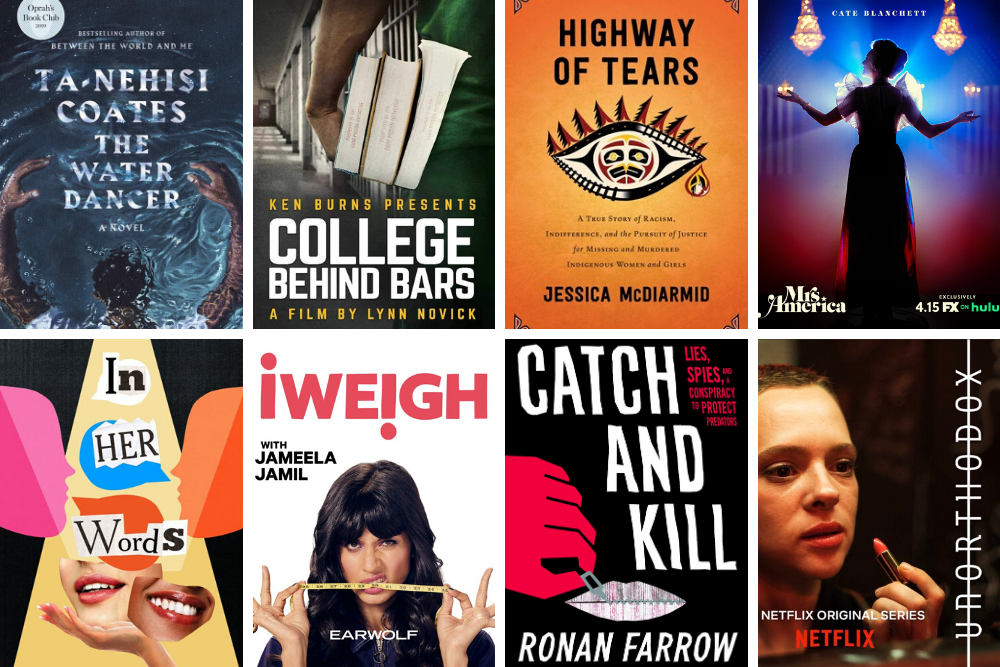
What We’re Watching, Reading, and Listening to While at Home
Looking for Something to Fill the Time While at Home? Check out These WFCO Staff Recommendations
With the current COVID-19 pandemic significantly altering the way we work and live, many of us are spending most, if not all of our time in our homes helping to flatten the curve and prevent overwhelming our frontline workers. For the past seven weeks, The Women’s Foundation of Colorado’s staff has been fortunate to have the option to work from home. Similar to the rest of world waiting out this pandemic, we spend much of our free time consuming books, podcasts, television shows, and more that not only give us some reprieve from the crisis, but also give us new information and insights into our work. Below are recommendations of content that we’ve been reading, watching, and listening to while at home that we’re pleased to share with our supporters.
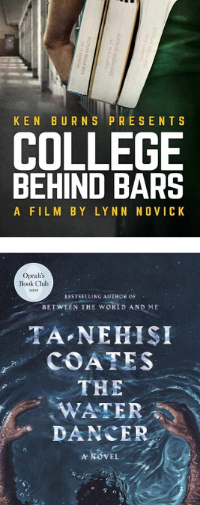 I have to be honest that I’ve neither read nor watched as much as I thought. It’s been hard to settle and separate from work and my desire to do better for more members of our community.
I have to be honest that I’ve neither read nor watched as much as I thought. It’s been hard to settle and separate from work and my desire to do better for more members of our community.
After too many “Law&Order” reruns, two incredible works stand out:
“The Water Dancer” is a stunningly written novel by a profound author. I love the language, imagery, and yearning. I am drawn into the undercurrent of a cold dark history that seeks light. There is a line, “But I was there and saw it happen, and have since seen a great many things that expose the ends of our knowledge and how much more lies beyond.” I feel that now.
I also was drawn into the sense of possibility and humanity of “College Behind Bars,” a documentary by Ken Burns. Recommended by my daughter, Jordan, “College Behind Bars” was as compelling a narrative as anything I’ve seen. Ken Burns is a master of some of the most poignant documentaries. Lynn Novick and team of directors, producers and editors are similarly gifted. Without sentimentality or manipulation, the viewer enters the lives of male and female inmates participating in the Bard Prison Initiative in New York State. In four well-paced one-hour segments, four years of following a small group of humans struggling to earn rigorous college degrees becomes a capstone experience. Filmed in maximum and medium security prisons, fully evolved personal stories play out. No excuses are made for why these individuals are incarcerated. The question is more about their transformative search for meaning, opportunity, education, and rehabilitation. The documentary made me openly laugh, cheer, and weep. Every bias of excellence, capability and justice we may hold is challenged.
– Lauren Y. Casteel, president & CEO
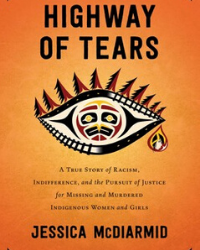 I’m reading “Highway of Tears,” a nonfiction/true crime book about the many Indigenous women who have disappeared along a remote highway in Canada’s Rocky Mountains. The Highway of Tears is a 725-kilometre stretch of highway in British Columbia that is a “microcosm of a national tragedy—and travesty…where Indigenous people face double the rate of violence of non-Indigenous people.” Being a woman or girl compounds the risk – they are six times more likely to be killed than non-indigenous women. It’s heartbreaking to read the accounts of the families whose daughters did not receive police prioritization or media attention when they disappeared. If they did, they often were categorized as prostitutes (instead of sexually exploited teens), runaways (though they’d never run away before), or having “poor lifestyle choices” (like hitchhiking).
I’m reading “Highway of Tears,” a nonfiction/true crime book about the many Indigenous women who have disappeared along a remote highway in Canada’s Rocky Mountains. The Highway of Tears is a 725-kilometre stretch of highway in British Columbia that is a “microcosm of a national tragedy—and travesty…where Indigenous people face double the rate of violence of non-Indigenous people.” Being a woman or girl compounds the risk – they are six times more likely to be killed than non-indigenous women. It’s heartbreaking to read the accounts of the families whose daughters did not receive police prioritization or media attention when they disappeared. If they did, they often were categorized as prostitutes (instead of sexually exploited teens), runaways (though they’d never run away before), or having “poor lifestyle choices” (like hitchhiking).
This “hierarchy of victims” is not new. It plays out with different settings, situations, and subjects every day – even now in this pandemic, where women and girls of color are already being disproportionately impacted. I admit this was not the most uplifting book to read during this “stay-at-home” period when bad news already floods our news feeds. But, I recommend it nonetheless, because it puts names to the numbers and tells the stories of these forgotten women and girls, their identities, their families, their hopes and their dreams.
– Lisa Christie, vice president of communications
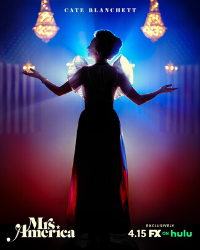
“Mrs. America” tells the story of the battle over the ratification of the Equal Rights Amendment across the 1970s. I’m only three episodes in and I’m hooked. “Mrs. America” is filled with women using their voices, kicking ass and doing it while remaining committed to their own values and style. “Mrs. America” shares many sides of the national debate over the ERA but hones in on two specific sides. Phyllis Schlafly and friends seeks to stop the ratification of the ERA championed by feminists such as Gloria Steinem, Betty Friedan, Shirley Chisholm, Bella Abzug, and Jill Ruckelshaus. I’m excited to sit in appreciation of this significant historical movement while recognizing that we have much to learn from the past. Women are so powerful especially when we come together!
– Renee Ferrufino, vice president of development
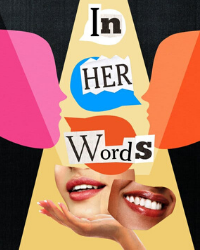 I don’t know about you, but for the past couple of months my inbox feels like it’s bursting at the seams with emails about the COVID-19 pandemic on top of my usual unruly stream of email subscriptions. I tried to keep up at first, reading work-from-home tips, poring over breaking news, signing up for endless webinars. But I quickly fell behind and now it’s nearly impossible for an email newsletter to escape my clutter folder – except for “In Her Words“. For the past two years, The New York Times’ newsletter on women, gender, and society, written by Alisha Haridasani Gupta, has created a world “Where women rule the headlines.”
I don’t know about you, but for the past couple of months my inbox feels like it’s bursting at the seams with emails about the COVID-19 pandemic on top of my usual unruly stream of email subscriptions. I tried to keep up at first, reading work-from-home tips, poring over breaking news, signing up for endless webinars. But I quickly fell behind and now it’s nearly impossible for an email newsletter to escape my clutter folder – except for “In Her Words“. For the past two years, The New York Times’ newsletter on women, gender, and society, written by Alisha Haridasani Gupta, has created a world “Where women rule the headlines.”
Yes, they use a gender-lens to analyze major world events and timely news stories, highlight the pay gap as well as barriers faced and challenges overcome by women in politics. But my favorite editions lift up stories and ideas that I never imagined would be given a headline: the hidden burden of quarantine happy hours, imperfect feminism, Buddhist nuns dedicated to social activism… and kung fu, and even how queens of pop Ariana Grande and Cardi B are using music video tropes created by men and “expertly extracting the testosterone.”
Especially while social distancing, when I see a notification from The New York Times come through Outlook, I can’t wait to spend a few moments of my day exploring the world through women’s words.
– Camisha Lashbrook, donor relations manager
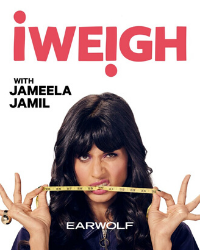 The podcast, “iWeigh with Jameela Jamil” challenges society’s definition of worth with the fundamental idea that a women’s weight is her contribution to society, to her family, her career, herself, and not a measurement on a scale. Jameela ( I feel like we’re friends now) interviews celebrities in brutally honest and frank conversations about the obstacles they faced to achieve their success. Listen with headphones though, Jameela is a fan of NSFW language!
The podcast, “iWeigh with Jameela Jamil” challenges society’s definition of worth with the fundamental idea that a women’s weight is her contribution to society, to her family, her career, herself, and not a measurement on a scale. Jameela ( I feel like we’re friends now) interviews celebrities in brutally honest and frank conversations about the obstacles they faced to achieve their success. Listen with headphones though, Jameela is a fan of NSFW language!
– Colleen LaFontaine, director of development
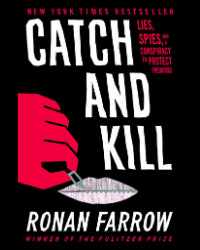 Women face innumerable barriers in the path to economic security and there is no question that among those barriers is workplace safety. Acknowledging that women in low-wage and hourly work might experience this differently than women with higher wages, this is still an important story given its tie to our current society and culture. And, at a time when confidence in media is at an all-time low, a reminder of the power and ethics that are integral in investigative journalism. Ronan Farrow does an incredible job of detailing his path to exposing serial abuser Harvey Weinstein and his powerful network of enablers in his book, “Catch and Kill.”
Women face innumerable barriers in the path to economic security and there is no question that among those barriers is workplace safety. Acknowledging that women in low-wage and hourly work might experience this differently than women with higher wages, this is still an important story given its tie to our current society and culture. And, at a time when confidence in media is at an all-time low, a reminder of the power and ethics that are integral in investigative journalism. Ronan Farrow does an incredible job of detailing his path to exposing serial abuser Harvey Weinstein and his powerful network of enablers in his book, “Catch and Kill.”
Farrow’s storytelling makes you feel like you are right there with him while he’s being chased by former spies, fighting for what’s right with powerful media, and ultimately succeeding in exposing a massive cover up and the truth in Weinstein’s decades of violence and abuse. This nonfiction recap of Farrow’s investigation is captivating and not only unpacks the (almost) unbelievable power of Weinstein but also shows the deep connections of the elite and their ability to control the truth.
P.S. There’s a podcast, too!
– Alison Friedman Phillips, director of programs
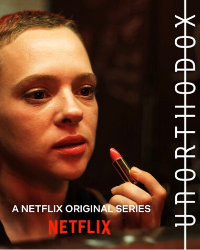 Is it just me, or is Netflix really coming through with the content these days? Recently, I watched a recently released original miniseries from the streaming platform, titled “Unorthodox.” It is a beautifully executed series that tells the story of a woman fleeing from her husband and confined life within Brooklyn’s Hasidic Satmar community. The concept of the series is based on Deborah Feldman’s 2012 memoir, “Unorthodox: The Scandalous Rejection of My Hasidic Roots.” Journeying all the way from New York to Berlin, the protaganist, Esty, leaves the only life she has ever known hoping to experience a new one full of choice and freedom despite having no money, almost no familial support, and no education.
Is it just me, or is Netflix really coming through with the content these days? Recently, I watched a recently released original miniseries from the streaming platform, titled “Unorthodox.” It is a beautifully executed series that tells the story of a woman fleeing from her husband and confined life within Brooklyn’s Hasidic Satmar community. The concept of the series is based on Deborah Feldman’s 2012 memoir, “Unorthodox: The Scandalous Rejection of My Hasidic Roots.” Journeying all the way from New York to Berlin, the protaganist, Esty, leaves the only life she has ever known hoping to experience a new one full of choice and freedom despite having no money, almost no familial support, and no education.
Born into a community where a woman’s sole purpose in life is to marry and have lots of children, this series is an eye-opening look into the struggles a woman faces when she decides that she wants something different from her life than what is expected. Starting from scratch isn’t easy, but Etsy’s resilience and determination to craft her own existence is nothing short of inspirational. I truly hope that we get a second season for this series so we can continue to witness Esty’s transformation and newfound independence, but until then I highly recommend jumping into this series if you have a few hours. And fun fact – it’s the first Netflix series to be primarily in Yiddish (with subtitles of course)!
– Erica Jackson, digital marketing specialist
… And if you’re just looking for something to inspire and relax your mind, listen to these two suggestions below!
I listen to Ted Talks on my daily walks and there are two speakers that were inspirational:
- Louis Schwartzberg – Nature. Beauty. Gratitude – photographic project that highlights the appreciation of life from the prospective of a child and an elderly man.
- Carl Honore – In Praise of Slowness – A world obsessed with speed, with doing everything faster, with cramming more and more into less and less time – is it possible, or even desirable, to slow down? This slowing down thing really does work.

